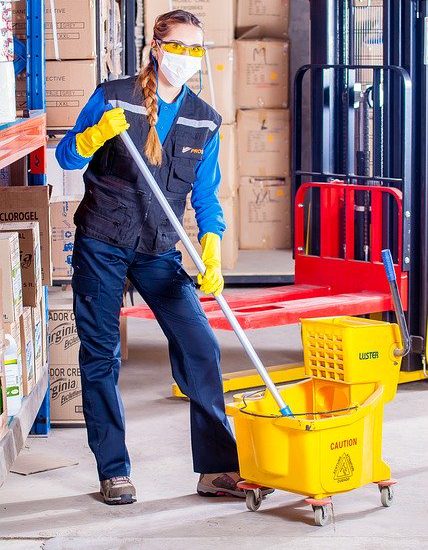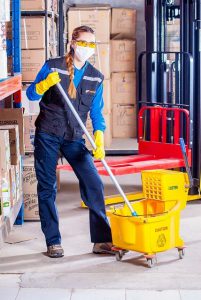- March 18, 2020
- Posted by: David Marshall
- Category: Management, Manufacturing, Safety

Over the years, I have developed a management philosophy I call the Four Non-Negotiables. For the next few weeks, I’ll share what each of them are and what they mean. This week is about Non-Negotiable #2, Housekeeping
Housekeeping in any organization, not just a factory, should be everybody’s responsibility and not just the maintenance staff. If something is on the floor, pick it up. If a drawer is open, close it. If something is in a pathway, move it to where it should be.
It doesn’t even matter if you didn’t make the mess. If you’re standing next to it, you own it, so you clean it.
Think about how Housekeeping affects Safety. Someone can slip on a spill on a tile floor. Someone can hurt themselves on an open door. A lot of times, injuries are just caused by carelessness and someone leaving something out.
But Safety is everyone’s responsibility, which means Housekeeping is also everyone’s responsibility, in a manufacturing setting as well as an office setting. Nobody is excluded.
If you’re taking things out of boxes and you throw the boxes in a pile, that’s a fire hazard. So immediately get rid of the boxes. Break them down, pile them up, and dispose of them in the appropriate place.
If you receive material bundled on a pallet with metal strapping, and you cut the metal strapping to get to the material, that becomes a safety hazard because somebody could trip or cut themselves, or a forklift could run over it and the strapping could wrap itself around the axle. So dispose of the metal strapping appropriately before you start unloading the pallet.
And, of course, there’s a matter of having pride in your workplace. Not just your desk or workstation, but the place where you spend at least a third of your week. Take some pride and imagine what it would be like if you invite an honored guest to tour your workplace.
In fact, you do, frequently. Nearly every company has customers and vendors who come into the business, and they should not be subjected to that kind of poor housekeeping. Imagine what they’ll think of you and the work you do if your workplace is dirty and messy.
If a toilet bowl is blocked, unblock it, especially if you blocked it. If you wash your hands, wipe the basin down, because there’s someone who’s going to follow you. If you’ve used the cafeteria or kitchen area, pick up your stuff and clear and wipe down the table, and throw away your trash.
Remember, this isn’t just for the janitor. We shouldn’t have to live and work in filth and trash until the janitor shows up after hours, cleaning the place so you can dirty it up again.
To drive this idea home, I created a rotation system at Robroy where everybody in the organization, including me, had to take a day and patrol all the washrooms, all the break areas, and clean them if they were dirty.
And yes, that meant the men patrolled the women’s washrooms, and the women patrolled the men’s washrooms. Within six months, people began to discipline each other, and get on each other to clean up their own mess.
I’m sure you’ve gone into public washrooms that were an absolute pigsty. You didn’t create the mess, but somebody else did. In a public washroom, you don’t know who made the mess, and there’s not much you can do about it.
But in a business, it can only be the people who work there who created the mess. And if everyone has to take a turn in cleaning it, they very quickly become conditioned to making sure it stays clean when it’s not their turn. After all, they didn’t want to clean up someone else’s mess, so they made sure not to leave a mess.
Call it Mutually Assured Contamination
When they saw a colleague leaving or making a mess, they helped their colleague understand why it needed to be cleaned, and not left for someone else.
Now, when the men have to go into a woman’s bathroom and clean it up, and when the women have to go into a men’s bathroom and clean it up, particularly managers, they develop an appreciation for the fact that everybody should be an adult about the whole thing
Just like our Safety principle, we had a few people — not a very large percentage — who didn’t think this applied to them, and they refused to participate. But they moved on to a new destiny, and everyone else was on board.
I remember one time, when we were returning from a two-week shutdown, and were ready to start back to work, but I shut the plant back down because the Housekeeping was not up to snuff. It didn’t meet the high standard I had set of being its best. So everybody, it didn’t matter who, had to grab a rag or a paintbrush or whatever was necessary to make the place impeccable. And only then, did we open back up for operation.
Keep in mind, this was a multi-million dollar operation, and we had just shut down for 14 days. But I shut it back down and asked everyone to clean it up, because it wasn’t as clean as it could be.
Why? Because the underlying philosophy behind Safety and Housekeeping being non-negotiable is that it creates a sense of attention to detail in everybody. That attention to detail has a tendency to translate into quality.
For example, if you have to have a sticker on an electrical outlet, you don’t put the sticker over where the electrical prongs go into the outlet. If the only requirement is to put a sticker on the outlet, you can put the sticker anywhere. And we all know companies, and people, who will cover the outlet. But if you pay attention to detail, you will put it in an appropriate place, because you’ll understand that people are actually going to use that outlet.
Housekeeping is a matter of having pride in your workplace, cleaning up after yourself, and keeping your working conditions safe. If you can manage your housekeeping for you and your associates, you can help reduce the number of workplace accidents.
I’ve been a manufacturing executive, as well as a sales and marketing professional, for a few decades. Now I help companies turn around their own business using the Four Non Negotiables as a template. If you would like more information, please visit my website and connect with me on Twitter, Facebook, or LinkedIn.
Photo credit: Voltamax (Pixabay.com, Creative Commons 0)

